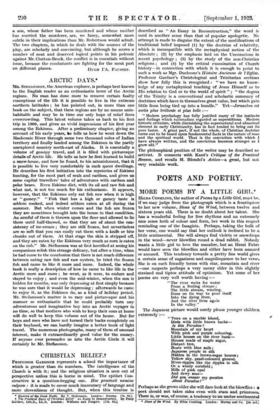CHRISTIAN BELIEFA
PROFESSOR GA.R.DNER represents a school the importance of which is greater than its numbers. The intelligence of the Church is with it; and the religious situation is seen out of perspective unless this is borne in mind. The epithet Con- structive is a question-begging one. Hoc praetexit nornine culpam : it is made to cover much inaccuracy of language and more slovenliness of thought. But, when this treatise is • ituntevit of she Great North. By V. Stetan.sson. London: liarrap. (73. ed.] t The Practical Basis of Christian Belief • an Essay in Reconstruction. By Percy Gardner, Litt.D„ LL.D. London: Williams and Norgate. [12s. 135.1 described as "An Essay in Reconstruction," the word is used in another sense than that of popular apologetic. No attempt is made to disguise the extent of the modifications of traditional belief imposed (1) by the doctrine of relativity, which is incompatible with the metaphysical notion of the Absolute ; (2) by the emphasis laid on the Unconscious in recent psychology ; (3) by the study of the non-Christian religions ; and (4) by the critical examination of Church history—in connection with which it is enough to point to such a work as Mgr. Duchesne's Histaire Ancienne de l'Eglise. Professor Gardner's Christological and Trinitarian sections show how fully this is recognized : "we have no know- ledge of any metaphysical teaching of Jesus Himself as to His relation to God OF to the world of spirit " ; "the dogma of the Trinity is a conventional and scholastic summary of doctrines which have in themselves great value, but which gain little from being tied up into a bundle." Yet—Jerusalem est sortie plus brillante et plus belle :— "Modern psychology has fully justified many of the instincts and feelings which rationalism regarded as superstitious. Modern historic criticism, while diminishing the supernatural and abnormal element in early Christianity, has in fact tended to bring out its pure lustre. A great part, if not the whole, of Christian doctrine turns out to be based upon fundamental facts in the nature of man and the spiritual world. That is the conviction with which I have always written, and the conviction becomes stronger as I grow old."
The philosophical position of the writer may be described as activist. It connects with Kant's Critique of the Practical Reason, and recalls M. Blondel's Action—a great, but not very readable work.


































 Previous page
Previous page